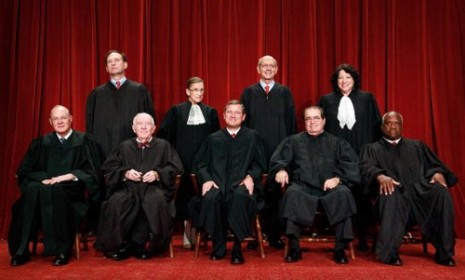Did the Supreme Court shred Miranda rights?
A split court says suspects have to speak up to invoke their right to remain silent. Did the justices cut down Miranda, or merely "prune" it a little?

A free daily email with the biggest news stories of the day – and the best features from TheWeek.com
You are now subscribed
Your newsletter sign-up was successful
The conservative and liberal wings of the Supreme Court clashed openly, splitting 5-to-4, in a ruling that more narrowly defines a criminal suspect's right to remain silent under the landmark 1966 decision in Miranda v. Arizona. The conservative majority ruled that police still have to inform anyone they arrest that he has the right to refuse questioning, but can continue to question him, unless he clearly says he wants to remain silent or wants a lawyer. In a heated dissent, Justice Sonia Sotomayor said that forcing suspects to talk in order to exercise their right to remain silent "turns Miranda upside down." Did the court gut Miranda, or simply make it more clear?
Americans just lost the right to remain silent: The Supreme Court just "dealt Miranda a death blow," says Charles Weisselberg in The Huffington Post. The suspect in this case, Van Chester Thompkins, stayed quiet through nearly three hours of questioning — making it clear he didn't want to talk — before finally blurting out something that helped convict him for murder. Now that the Supreme Court says that's okay, Miranda's safeguards are "mostly symbolic," and police can interrogate suspects as relentlessly as they want.
"Elena Kagan and the death of Miranda"
The Week
Escape your echo chamber. Get the facts behind the news, plus analysis from multiple perspectives.

Sign up for The Week's Free Newsletters
From our morning news briefing to a weekly Good News Newsletter, get the best of The Week delivered directly to your inbox.
From our morning news briefing to a weekly Good News Newsletter, get the best of The Week delivered directly to your inbox.
Relax. We still have all our constitutional rights: The right to remain silent under the Miranda ruling is an "an entirely artificial rule grafted onto the Constitution by the Supreme Court," says Kent Scheidegger in the Crime and Consequences blog. The justices have every right to prune it back, or even to abandon it altogether. All the Constitution really guarantees is that citizens can't be forced to say things to incriminate themselves, and that right has never been threatened.
This will definitely change the way suspects are interrogated: Many police department manuals tell officers not to do any questioning "until they have obtained an explicit waiver of the suspect’s rights," says Lyle Denniston at SCOTUSBlog. Now it's clear that "is not constitutionally required." Now, unless a suspect states clearly that he wants to remain silent, police are free to question him for hours "in hopes eventually of getting him to confess," so this decision has "decisively tilted" the interrogation game in favor of the police.
"Analysis: Tilting Miranda toward the police"
A free daily email with the biggest news stories of the day – and the best features from TheWeek.com